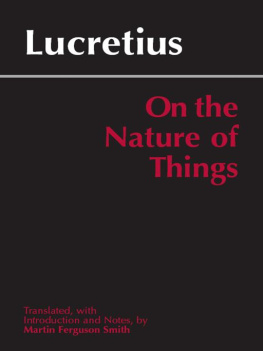Lucretius - On the Nature of Things
Here you can read online Lucretius - On the Nature of Things full text of the book (entire story) in english for free. Download pdf and epub, get meaning, cover and reviews about this ebook. genre: Science. Description of the work, (preface) as well as reviews are available. Best literature library LitArk.com created for fans of good reading and offers a wide selection of genres:
Romance novel
Science fiction
Adventure
Detective
Science
History
Home and family
Prose
Art
Politics
Computer
Non-fiction
Religion
Business
Children
Humor
Choose a favorite category and find really read worthwhile books. Enjoy immersion in the world of imagination, feel the emotions of the characters or learn something new for yourself, make an fascinating discovery.
On the Nature of Things: summary, description and annotation
We offer to read an annotation, description, summary or preface (depends on what the author of the book "On the Nature of Things" wrote himself). If you haven't found the necessary information about the book — write in the comments, we will try to find it.
On the Nature of Things — read online for free the complete book (whole text) full work
Below is the text of the book, divided by pages. System saving the place of the last page read, allows you to conveniently read the book "On the Nature of Things" online for free, without having to search again every time where you left off. Put a bookmark, and you can go to the page where you finished reading at any time.
Font size:
Interval:
Bookmark:
The Project Gutenberg EBook of Of The Nature of Things, by
[Titus Lucretius Carus] Lucretius
This eBook is for the use of anyone anywhere at no cost and with
almost no restrictions whatsoever. You may copy it, give it away or
re-use it under the terms of the Project Gutenberg License included
with this eBook or online at www.gutenberg.org
Title: Of The Nature of Things
Author: [Titus Lucretius Carus] Lucretius
Translator: William Ellery Leonard
Release Date: July 31, 2008 [EBook #785]
Language: English
*** START OF THIS PROJECT GUTENBERG EBOOK OF THE NATURE OF THINGS ***
Produced by Levent Kurnaz, and David Widger
BOOK I SUBSTANCE IS ETERNAL THE VOID NOTHING EXISTS per se EXCEPT ATOMS AND THE VOID CHARACTER OF THE ATOMS CONFUTATION OF OTHER PHILOSOPHERS THE INFINITY OF THE UNIVERSE BOOK II PROEM ATOMIC MOTIONS ATOMIC FORMS AND THEIR COMBINATIONS INFINITE WORLDS BOOK III PROEM NATURE AND COMPOSITION OF THE MIND THE SOUL IS MORTAL FOLLY OF THE FEAR OF DEATH BOOK IV PROEM EXISTENCE AND CHARACTER OF THE IMAGES THE SENSES AND MENTAL PICTURES SOME VITAL FUNCTIONS THE PASSION OF LOVE BOOK V PROEM THE WORLD IS NOT ETERNAL ORIGINS OF VEGETABLE AND ANIMAL LIFE ORIGINS AND SAVAGE PERIOD OF MANKIND BEGINNINGS OF CIVILIZATION BOOK VI PROEM GREAT METEOROLOGICAL PHENOMENA, ETC. THE PLAGUE ATHENS |
Mother of Rome, delight of Gods and men,
Dear Venus that beneath the gliding stars
Makest to teem the many-voyaged main
And fruitful landsfor all of living things
Through thee alone are evermore conceived,
Through thee are risen to visit the great sun
Before thee, Goddess, and thy coming on,
Flee stormy wind and massy cloud away,
For thee the daedal Earth bears scented flowers,
For thee waters of the unvexed deep
Smile, and the hollows of the serene sky
Glow with diffused radiance for thee!
For soon as comes the springtime face of day,
And procreant gales blow from the West unbarred,
First fowls of air, smit to the heart by thee,
Foretoken thy approach, O thou Divine,
And leap the wild herds round the happy fields
Or swim the bounding torrents. Thus amain,
Seized with the spell, all creatures follow thee
Whithersoever thou walkest forth to lead,
And thence through seas and mountains and swift streams,
Through leafy homes of birds and greening plains,
Kindling the lure of love in every breast,
Thou bringest the eternal generations forth,
Kind after kind. And since 'tis thou alone
Guidest the Cosmos, and without thee naught
Is risen to reach the shining shores of light,
Nor aught of joyful or of lovely born,
Thee do I crave co-partner in that verse
Which I presume on Nature to compose
For Memmius mine, whom thou hast willed to be
Peerless in every grace at every hour
Wherefore indeed, Divine one, give my words
Immortal charm. Lull to a timely rest
O'er sea and land the savage works of war,
For thou alone hast power with public peace
To aid mortality; since he who rules
The savage works of battle, puissant Mars,
How often to thy bosom flings his strength
O'ermastered by the eternal wound of love
And there, with eyes and full throat backward thrown,
Gazing, my Goddess, open-mouthed at thee,
Pastures on love his greedy sight, his breath
Hanging upon thy lips. Him thus reclined
Fill with thy holy body, round, above!
Pour from those lips soft syllables to win
Peace for the Romans, glorious Lady, peace!
For in a season troublous to the state
Neither may I attend this task of mine
With thought untroubled, nor mid such events
The illustrious scion of the Memmian house
Neglect the civic cause.
Whilst human kind
Throughout the lands lay miserably crushed
Before all eyes beneath Religionwho
Would show her head along the region skies,
Glowering on mortals with her hideous face
A Greek it was who first opposing dared
Raise mortal eyes that terror to withstand,
Whom nor the fame of Gods nor lightning's stroke
Nor threatening thunder of the ominous sky
Abashed; but rather chafed to angry zest
His dauntless heart to be the first to rend
The crossbars at the gates of Nature old.
And thus his will and hardy wisdom won;
And forward thus he fared afar, beyond
The flaming ramparts of the world, until
He wandered the unmeasurable All.
Whence he to us, a conqueror, reports
What things can rise to being, what cannot,
And by what law to each its scope prescribed,
Its boundary stone that clings so deep in Time.
Wherefore Religion now is under foot,
And us his victory now exalts to heaven.
I know how hard it is in Latian verse
To tell the dark discoveries of the Greeks,
Chiefly because our pauper-speech must find
Strange terms to fit the strangeness of the thing;
Yet worth of thine and the expected joy
Of thy sweet friendship do persuade me on
To bear all toil and wake the clear nights through,
Seeking with what of words and what of song
I may at last most gloriously uncloud
For thee the light beyond, wherewith to view
The core of being at the centre hid.
And for the rest, summon to judgments true,
Unbusied ears and singleness of mind
Withdrawn from cares; lest these my gifts, arranged
For thee with eager service, thou disdain
Before thou comprehendest: since for thee
I prove the supreme law of Gods and sky,
And the primordial germs of things unfold,
Whence Nature all creates, and multiplies
And fosters all, and whither she resolves
Each in the end when each is overthrown.
This ultimate stock we have devised to name
Procreant atoms, matter, seeds of things,
Or primal bodies, as primal to the world.
I fear perhaps thou deemest that we fare
An impious road to realms of thought profane;
But 'tis that same religion oftener far
Hath bred the foul impieties of men:
As once at Aulis, the elected chiefs,
Foremost of heroes, Danaan counsellors,
Defiled Diana's altar, virgin queen,
With Agamemnon's daughter, foully slain.
She felt the chaplet round her maiden locks
And fillets, fluttering down on either cheek,
And at the altar marked her grieving sire,
The priests beside him who concealed the knife,
And all the folk in tears at sight of her.
With a dumb terror and a sinking knee
She dropped; nor might avail her now that first
'Twas she who gave the king a father's name.
They raised her up, they bore the trembling girl
On to the altarhither led not now
With solemn rites and hymeneal choir,
But sinless woman, sinfully foredone,
A parent felled her on her bridal day,
Making his child a sacrificial beast
To give the ships auspicious winds for Troy:
Such are the crimes to which Religion leads.
And there shall come the time when even thou,
Forced by the soothsayer's terror-tales, shalt seek
To break from us. Ah, many a dream even now
Can they concoct to rout thy plans of life,
And trouble all thy fortunes with base fears.
I own with reason: for, if men but knew
Some fixed end to ills, they would be strong
By some device unconquered to withstand
Religions and the menacings of seers.
But now nor skill nor instrument is theirs,
Since men must dread eternal pains in death.
For what the soul may be they do not know,
Whether 'tis born, or enter in at birth,
Font size:
Interval:
Bookmark:
Similar books «On the Nature of Things»
Look at similar books to On the Nature of Things. We have selected literature similar in name and meaning in the hope of providing readers with more options to find new, interesting, not yet read works.
Discussion, reviews of the book On the Nature of Things and just readers' own opinions. Leave your comments, write what you think about the work, its meaning or the main characters. Specify what exactly you liked and what you didn't like, and why you think so.











